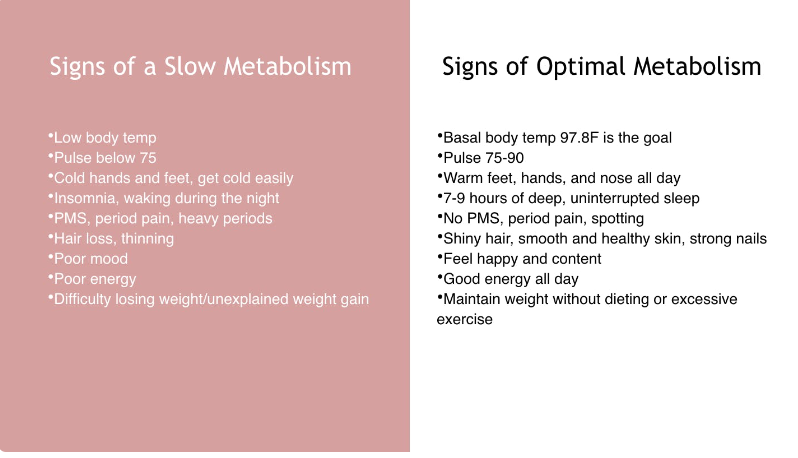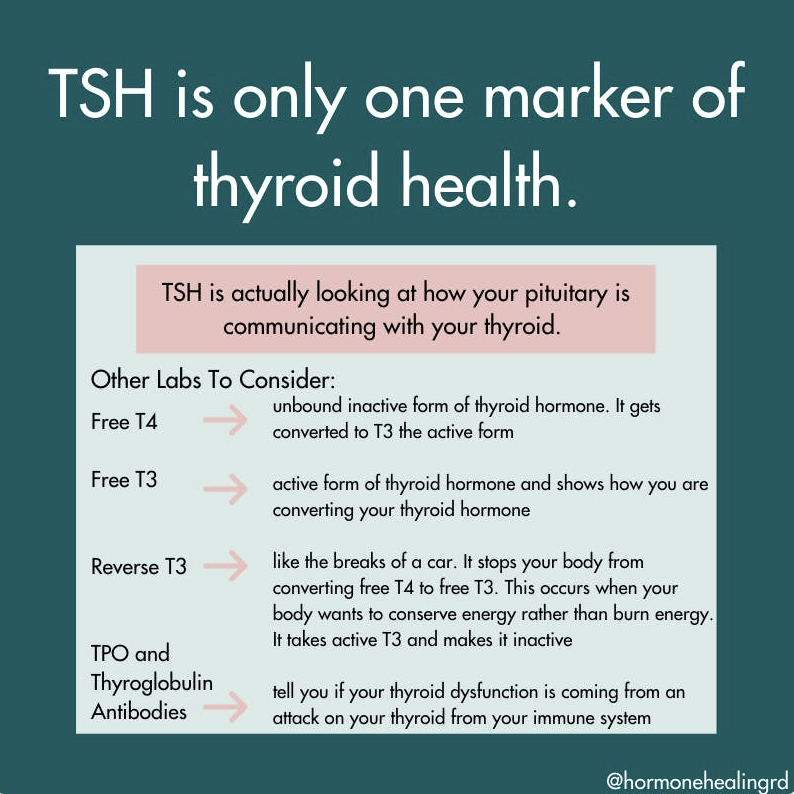There’s not a day that goes by that I don’t get a direct message or email asking me how to naturally increase or decrease a hormone/fix digestive issue/acne/etc. Honestly, I don’t even get irritated. I’ve been there. I know what it’s like to be desperate and to feel like no one is giving you any real answers. I’ve my labs come “normal” more times than I can count even though I felt my worst.
So what does healthy thyroid function look like? The image below says metabolism, but this applies to the thyroid as well. If you think about it, your metabolism is really just how your cells are using energy. This energy is what fuels all of the different processes in the body. Because our thyroid impacts us on a cellular level across the board inside the body, it can be the root of many problems. Thyroid dysfunction has a unique presentation in different people.
For example, a sluggish thyroid could lead to acne in one person and hair loss in another.

Thyroid & Your Hormones
Our ovaries require adequate thyroid hormone in order to get the surge in estrogen that triggers the egg to be released during ovulation. Thyroid hormone is also responsible for the amount of progesterone produced. If the corpus luteum in the ovaries doesn’t get adequate thyroid hormone, we don’t produce as much progesterone. We need adequate progesterone levels in order to have a healthy luteal phase, which allows us to conceive.
An optimal luteal phase for conception/adequte progesterone levels is 12-14 days. If your luteal phase is less than 10 days, that’s a sign of low progesterone. Low progesterone is very common with hypothyroidism and subclinical thyroid dysfunction because of how thyroid hormone impacts the ovaries.
Excess estrogen can negatively impact thyroid function because of steroid hormone binding globulin. Excess estrogen triggers an increase in this protein and unfortunately it can also bind to thyroid hormone. That means less thyroid hormone to go around for the rest of your body. Did you know every cell in your body has a thyroid hormone receptor? That shows how important this essential hormone is for ALL processes in the body.
Making Sense of Thyroid Testing & How To Gain Insight Into Thyroid Function At Home
I can’t tell you how many times I’ve asked a client if they’ve had their thyroid tested and they come back with “yes, it was normal.”
I proceed to ask about the actual results and most don’t even have them. Their doctor called to tell them their TSH was normal and that was that. The problem with this is that understanding how your thyroid is functioning is so much more than TSH.
TSH is actually telling you how much your pituitary is talking to your thyroid and demanding that it make more hormones. There’s a lot more to thyroid function than TSH.

I recommend getting the following tested if you suspect thyroid dysfunction:
This gives you a much more complete picture of your thyroid function and where you may need support.
Since the thyroid impacts how the entire body runs, there are plenty of signs you can track on your own that can indicate thyroid function. My favorite sign to monitor is body temperature. Your body temperature gives you insight into where your thyroid function is at the moment.
At Home Thyroid Monitoring
Basal Body Temperature & Your Thyroid
Dr. Broda Barnes was assigned to thyroid research when he entered med school even though he wanted to focus on sex hormones. Little did he know that what he would learn about thyroid function would directly relate to how balanced our sex hormones are.
As Dr. Barnes dug more into thyroid dysfunction and how to best identify it, he found that the tests were wildly inaccurate. They used to test thyroid function via measuring basal metabolism at rest through oxygen. Then T4 was able to be measured and then T3 was found. The issue is that this only shows more severe thyroid dysfunction. He would see patients that clearly had thyroid dysfunction, but didn’t qualify
BTW- this was all discovered in the 1950-1970’s. It’s sad that his research hasn’t come to the forefront since it’s helpful on a practical level vs. thyroid blood tests.
This is where basal body temperature comes in. Instead of relying on oxygen tests that were very impractical, expensive, and not as accurate, Dr. Barnes discovered that body temperature at rest is a great measurement of thyroid function.
Basal Body Temperature (BBT) is your temperature first thing in the morning before you get out of bed. You can technically use any thermometer to measure this, but it’s more accurate if you have a basal body theremometer, which just means it goes to the 100th degree (98.45F vs. 98.4F).
Menstruating women’s body temperature will increase during the second half of your cycle after ovulation occurs and will be lowest during the 2nd and 3rd day of your period (typically). Looking at your BBT during the first part of your cycle is helpful to get an idea of thyroid function. Ideally you want the first half of your cycle to be 97.6F on average and the second half to be 98.4F on average. When your body temperature is below this, it’s a sign of less heat being produced AKA a sluggish thyroid.
Learn more about how to support your thyroid in these two podcast episodes, supporting optimal thyroid health with kaely, rd and Supporting Autoimmune Thyroid Disorders with Nicole Fennell.
And don’t forget to check out my free thyroid-mineral connection webinar!
reminder: i’m currently taking on 1:1 clients. if you’d like to explore what it would be like to work together and if we are a good fit, fill out this form to get more details!
